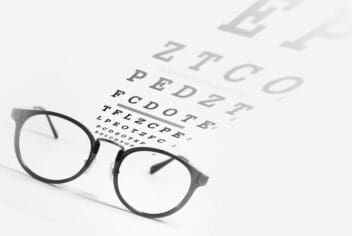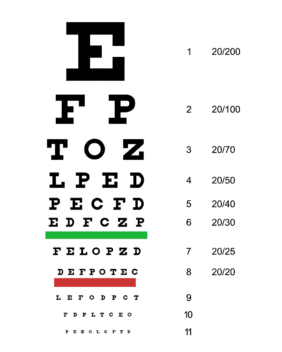Further Reading
What Strength Glasses Are Right for You? (For Reading & More)
Home / Everything About Glasses /
Last Updated:
Table of Contents
Reading glasses strengths vary.
Low-strength reading glasses possess powers of +0.25 diopters. High-strength reading glasses can exceed +2.50 diopters. In rare cases, individuals may need reading glasses of up to +4.00 in order to read.
Custom reading glasses will need to be ordered beyond +2.75 diopters as higher reading glasses strengths are less commonly available in retail locations or when it comes to online purchasing.
Depending on the eye condition, individuals may experience different levels of efficacy when it comes to reading glasses. For example, those who are nearsighted might not find reading glasses at a strength that works effectively. In such scenarios, it’s best to consult with an eye care professional for further guidance.
Why Are Reading Glasses Needed?

As people advance in age, it’s quite common to need reading glasses, especially for seemingly simple everyday tasks such as reading.
Vision loss associated with getting older is generally classified as presbyopia. Vision loss associated with advanced age can impede an individual’s ability to see clearly while reading as well as your ability to perform numerous everyday tasks.
You deserve clear vision. We can help.
With 135+ locations and over 2.5 million procedures performed, our board-certified eye surgeons deliver results you can trust. Your journey to better vision starts here.
Presbyopia occurs in just about everyone’s eyes over the course of the aging process, as the lens of the eye has a tougher time flexing over time. This flexing of the lens of the eye helps bring objects into focus.
Presbyopia generally starts to show itself at age 40 and can continue to develop into an individual’s late 60s. Many individuals opt to wear reading glasses to combat age-related vision loss.
How to Determine Which Reading Glasses Strength You Need
Optometrists generally agree on a sort of baseline for reading glasses. People who are ages 40 to 49 will generally need reading glasses at a strength of +0.75 to +1.50 diopters.
Individuals ages 50 to 59 will generally need reading glasses that have a strength of +1.50 to +2.25 diopters. Those who are age 61 and up often need reading glasses that have a strength of +2.25 to +2.75 diopters.
General age-related guidelines for reading glasses strengths:
| Age Range | Reading Glasses Strength |
| 40-44 | +0.75 to +1.00 diopter |
| 45-49 | +1.00 to +1.50 diopter |
| 50-54 | 1.50 to +2.00 diopter |
| 55-59 | +2.00 to +2.25 diopter |
| 61-65 | +2.25 to +2.50 diopter |
Reading Strength Tests
There are a few different tests that will help you determine your reading strength. While home tests can be useful to a degree, consulting with an eye doctor is the best way to determine which strength is best for you.
Options for reading glasses strength tests include online/printable diopter tests, in-person consultation with an eye doctor, or testing various magnifications at a retailer.
Printable Diopter Reading Test Card

Diopter test charts are perhaps the most common form of reading strength test. The diopter test charts contain rows of words with text that ranges in size.
Sizes of text correspond to certain strengths of reading glasses. Users will read the chart until they can identify a line that they can read clearly without glasses on. This test will give the power/magnification needed in order to read effectively.
In-Person Consultation
Seeing an eye doctor will help ensure you select the best reading glasses for your unique circumstances. An eye doctor will perform tests to gauge which reading glasses strength you will need in order to see clearly. An eye doctor will provide their own insights as well as go over all your options.
Testing Various Magnifications
Empirically testing out pairs of glasses that might be either weaker or stronger than your test results may help you further narrow down your required magnification. It is a general rule that you should always choose the lowest power you need for your reading glasses strength.
You deserve clear vision. We can help.
With 135+ locations and over 2.5 million procedures performed, our board-certified eye surgeons deliver results you can trust. Your journey to better vision starts here.
Things to Consider When Determining Reading Glasses Strengths
Most over-the-counter reading glasses start at +1.00 and increase in 0.25 increments. Here are some additional factors to consider when choosing reading glasses:
Functional Reading
You might need reading glasses offered at a higher strength in order to read directions, road maps, and some books. These sorts of reading materials are often smaller in print and more challenging to read. Ordering at a restaurant may also require reading glasses since menus often feature smaller print.
Online Viewing
Depending on browser settings, you may require reading glasses anywhere from +2.00 – +4.00 diopters in order to be able to read and see clearly via your computer and web browser. The good thing about online viewing is that you can select the size of the text as you see fit. Increase the size of text to make reading easier on your eyes.
Reading Large & Small Print Books
If you’re currently wearing reading glasses and you find yourself holding your reading material farther away, it’s likely you need a stronger set of reading glasses. Having to hold your reading materials closer generally implies that your reading glasses might be too strong. Try different strengths to see if your symptoms improve.
Where to Get Reading Glasses
When it comes to sourcing reading glasses, there are several options available. While it’s tempting to grab a low-cost pair from a local retail store or to quickly order one online, it’s crucial to understand that, as with many things, you often get what you pay for.
Retail Stores and Online Purchases
Many opt for the convenience of picking up reading glasses from local retail stores or ordering them online. These glasses are often generic in fit and may not cater to individual eye differences or astigmatism. They are produced in bulk and often reflect their low price in terms of quality. While they might work for some, they are often a temporary solution.
Eye Doctor’s Prescription
For those looking for a long-term, quality solution, it’s recommended to consult with your eye doctor. They will not only help determine the correct strength you need but can also customize the lenses to fit your specific needs. These glasses, while possibly more expensive, will offer:
- A precise fit tailored to your face.
- Accurate lens power for each eye.
- Lenses that account for any astigmatism or other unique eye conditions.
- Higher quality frames that are more durable and comfortable.
Plus, an eye doctor can also detect and advise on other eye conditions that may be affecting your vision. This holistic approach ensures that you’re not just buying a lens to help with reading but taking care of your overall eye health.
Taking Care of Your Reading Glasses
Taking care of your reading glasses will help protect your investment and ensure you are never without these glasses. Make sure to rinse with water when cleaning the lenses, and keep your reading glasses in a safe place. Washing your reading glasses often will help to prolong the life of your reading glasses.
Allow your glasses to air dry when possible. Do not use paper towels or any textured material to dry your reading glasses.
When setting your glasses down, never leave them with the lenses touching any surface. This can scratch them.
As you advance in age, it’s a good idea to take a proactive approach to your vision and consult with an experienced eye care professional when any vision issues occur.
You deserve clear vision. We can help.
With 135+ locations and over 2.5 million procedures performed, our board-certified eye surgeons deliver results you can trust. Your journey to better vision starts here.
References
- Presbyopia – A Review of Current Treatment Options and Emerging Therapies. (May 2021). Clinical Ophthalmology.
- REVIEW. +2 to +3 D. Reading Glasses to Prevent Myopia. (February 2017). EC Ophthalmology.
- More Than Reading Glasses — New Options for ‘Old’ Eyes. (July 2022). The Washington Post.
- Presbyopia: Prevalence, Impact, and Interventions. (September 2007). Community Eye Health Journal.
- Tips for Choosing the Right Reading Glasses. (October 2017). American Academy of Ophthalmology.
- Age and Vision – Is It OK to Use Over-the-Counter Glasses? (November 2022). UCLA Health.
This content is for informational purposes only. It may have been reviewed by a licensed physician, but is not intended to serve as a substitute for professional medical advice. Always consult your healthcare provider with any health concerns. For more, read our Privacy Policy and Editorial Policy.